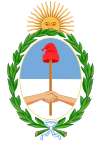
The logo of Argentina refers to the official logo of the Marca País (MP), a State policy of nation branding that aims to promote tourism, boost exports, attract investments and spread Argentine culture.

Carlos Enrique Meyer is an Argentine businessman and public official who was appointed as the nation's Minister of Tourism upon the post's establishment on July 1, 2010.
The Ministries of the Argentine Republic, which form the cabinet, currently consist of nine ministries under a ministerial chief of staff. The ministers are appointed by and serve at the pleasure of the president. The current organization derives from the constitutional revision of 1994, and is governed by "The Law on Ministries".
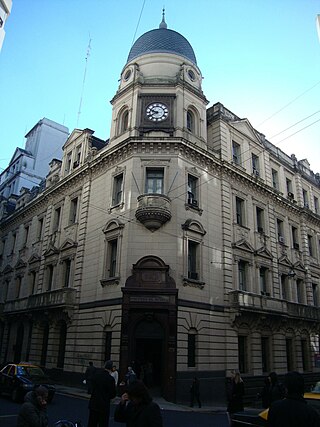
The Ministry of the Interior of Argentina is a ministry of the national executive power that manages issues pertaining to domestic politics such as immigration and co-ordination between the federal government and the governments of the provinces of Argentina.
The Ministry of Transport of Argentina was a national executive agency that managed transportation issues, including land, air, and sea transportation within the country.

The Ministry of Health of Argentina is a ministry of the national executive power that oversees, elaborates and coordinates the Argentine national state's public health policy. The ministry is responsible for overseeing Argentina's highly decentralized universal health care system, which according to 2000 figures, serviced over half of the country's population.

The Ministry of Public Works of Argentina was a ministry of the national executive power that oversaw and advised on the elaboration and maintenance of roadways, urban and hydraulic infrastructure and other types of public works.

The Ministry of Culture of Argentina was a ministry of the national executive power that oversaw the government's public policy on the culture of Argentina.
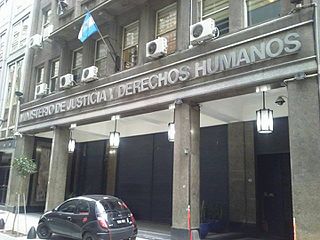
The Ministry of Justice and Human Rights of Argentina is a ministry of the national executive power tasked with enforcing of the law and administration of justice and upholding human rights.

The Ministry of Productive Development of Argentina was a ministry of the national executive power overseeing and advising on the promotion of industrial policies and foreign trade in Argentina.
The Ministry of Information and Tourism was a ministerial department of the Government of Spain created in 1951 during the dictatorship of Francisco Franco to control information and the censorship of press and radio. The ministry also assumed the management of Tourism, an important industry at that time when it had an important flowering. In historiography, some authors consider it as a simple Ministry of Propaganda.
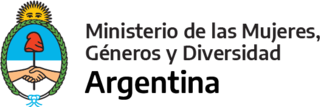
The Ministry of Women, Genders and Diversity was a ministry of the Argentine Government tasked with overseeing the country's public policies on issues affecting women and gender and sexual minorities. The ministry was created in 2019, as one of the initial measures of President Alberto Fernández; the first minister was Elizabeth Gómez Alcorta.

The Ministry of Agriculture, Livestock and Fisheries of Argentina, commonly known simply as the Ministry of Agriculture, was a ministry of the national executive power that oversaw production, commerce and health regulations in the agricultural, livestock and fishing industries.
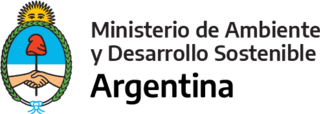
The Ministry of the Environment and Sustainable Development of Argentina was a ministry of the national executive power that oversaw the government's policy on environmental issues and promotes sustainable development.

The Ministry of Territorial Development and Habitat of Argentina was a ministry of the national executive power that oversaw and defined the Argentine state's policies on housing and habitat.

Matías Daniel Lammens Nuñez is an Argentine businessman and politician, who served as the country's Minister of Tourism and Sports from 2019 to 2023, in the cabinet of President Alberto Fernández. Since 2023, he has been a member of the Buenos Aires City Legislature.

The General Secretariat of the Presidency of the Argentine Nation is a secretariat of state of the Argentine National Executive counting with ministerial level, tasked with assisting the President of Argentina in the making of public policy, drafting messages and public speeches, maintaining the presidential protocol and overseeing the relationship between the President and society at large.

The Legal and Technical Secretariat of the Presidency of the Argentine Nation is a secretariat of state of the Argentine National Executive counting with ministerial level, tasked with assisting the President of Argentina, the Chief of the Cabinet of Ministers and all other dependencies of the President's Office that may not count with their own legal departments on the drafting of decrees, legislative bills, administrative decisions and legal messages.
The Secretariat of Comprehensive Policies on Drugs is a secretariat of state of the Argentine National Executive reporting to the Chief of the Cabinet of Ministers, tasked with assisting the population on drug use prevention and the treatment of drug addiction.

The Instituto de Turismo de España – Turespaña is the official agency of the Government of Spain responsible for the marketing of the country as a tourist destination throughout the world. It depends on the Ministry of Industry, Trade and Tourism through the Secretary of State for Tourism.

















